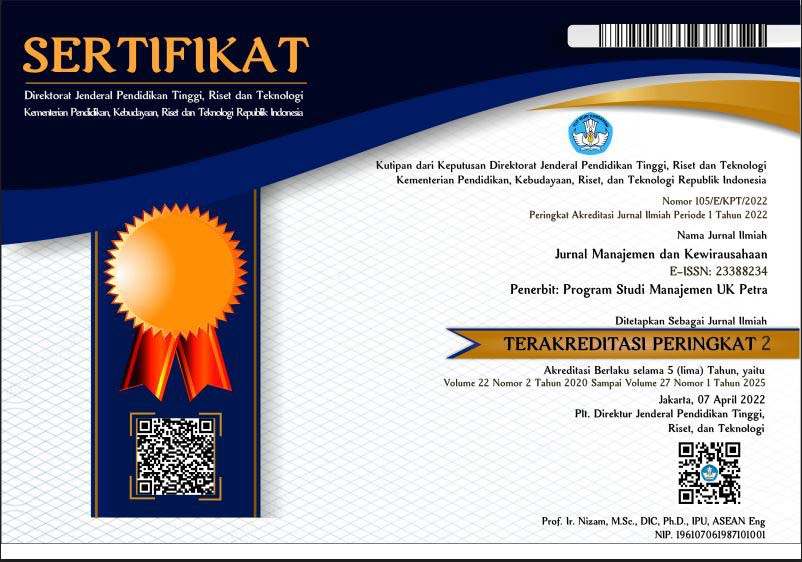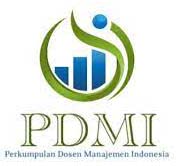MOTIVASI KERJA, KEPUASAN KERJA, DAN KOMITMEN ORGANISASIONAL KARYAWAN
 :
:
https://doi.org/10.9744/jmk.17.2.196-206
Keywords:
Work motivation, work satisfaction, organizational commitmentAbstract
This study was conducted to determine the effect of work motivation and job satisfaction on organizational commitment. The population amounted to 214 employees and the samples were 145 people. The sampling method was judgment sampling. The analytical method was multiple linear regression. The results indicated that work motivation variable had a positive and significant effect on organizational commitment. Job satisfaction also had a positive and significant influence on organizational commitment. Work motivation and job satisfaction had the same influence on organizational commitment and job satisfaction dominated. The increase in employee motivation was expected to help the company in increasing employee’s job satisfaction that directly affected the commitment of employees.
References
Brahmasari, I. & Suprayetno, A. (2008). Pengaruh motivasi kerja, kepemimpinan dan budaya organisasi terhadap kepuasan kerja karyawan serta dampaknya pada kinerja perusahaan (Studi kasus pada PT Pei Hai International Wiratama Indonesia). Jurnal Manajemen dan Kewirausahaan, 10(2), 124–135.
Buraidah & Waluyo, L. E. M. (2002). Pengaruh kompensasi dan motivasi kerja terhadap komitmen organisasi di organisasi pendidikan islam x. Diakses 23 Agustus 2012 dari http://www. Papers .gunadarma.ac.id/index.php/mpsi/.../15003.
Ghozali, I. (2012). Aplikasi analisis multivariate dengan program IBM SPSS. Semarang: Badan Penelitian Universitas Diponegoro.
Kartika, E. W. & Kaihatu, T. S. (2010). Analisis pengaruh motivasi kerja terhadap kepuasan kerja (Studi kasus pada karyawan restoran di Pakuwon Food Festival Surabaya). Jurnal Manajemen dan Kewirausahaan, 12(1), 100–112.
Kuncoro, M. (2009). Metode riset untuk bisnis dan ekonomi. Jogjakarta: Erlangga.
Muhadi (2007). Analisis pengaruh kepuasan kerja terhadap komitmen organisasional dalam mempengaruhi kinerja karyawan. Unpublished undergraduated thesis, Universitas Diponegoro, Semarang.
Murti, H. & Srimulyani, V. A. (2013). Pengaruh motivasi terhadap kinerja pegawai dengan variabel pemediasi kepuasan kerja pada PDAM Kota Madiun. Jurnal Riset Manajemen dan Akuntansi, 1(1), 10–17.
Panggalih, B. & Zulaicha, R. (2012). Pengaruh kepuasan kerja terhadap organizational citizenship behavior dengan motivasi kerja sebagai variabel intervening pada karyawan PT Telkom Tegal. Performance, 16(2), 1–15.
Subyantoro, A. (2009). Karakteristik individu, karakteristik pekerjaan, karakteristik organisasi dan kepuasan yang dimediasi oleh motivasi kerja. Jurnal Aplikasi Manajemen, 11(1), 11–19.
Sudiro, A. (2008). Pengaruh komitmen keorganisasian dan kepuasan kerja terhadap kinerja tenaga edukatif/dosen (Studi di Universitas Brawijaya Malang). Jurnal Aplikasi Manajemen, 7(1), 86–92.
Sugiyono (2011). Metode penelitian kuantitatif kualitatif dan r & d. Bandung: Alfabeta.
Sumarto. 2009. Meningkatkan komitmen dan kepuasan untuk menyurutkan niat keluar. Jurnal Manajemen dan Kewirausahaan, 11(2), 116–125.
Sutanto, E. M. & Tania, A. (2013). Pengaruh motivasi kerja dan kepuasan kerja terhadap komitmen organisasional karyawan PT Dai Knife di Surabaya. Agora, 1(3), 1–9.
Downloads
Published
How to Cite
Issue
Section
License
Authors who publish on this journal agree to the following terms:
- Authors retain copyright and grant the journal right of first publication with the work simultaneously licensed under a Creative Commons Attribution License that allows others to share the work with an acknowledgement of the work's authorship and initial publication in this journal.
- Authors are able to enter into separate, additional contractual arrangements for the non-exclusive distribution of the journal's published version of the work (e.g., post it to an institutional repository or publish it in a book), with an acknowledgement of its initial publication in this journal.
- Authors are permitted and encouraged to post their work online (e.g., in institutional repositories or on their website) prior to and during the submission process, as it can lead to productive exchanges, as well as earlier and greater citation of published work (See The Effect of Open Access).

















